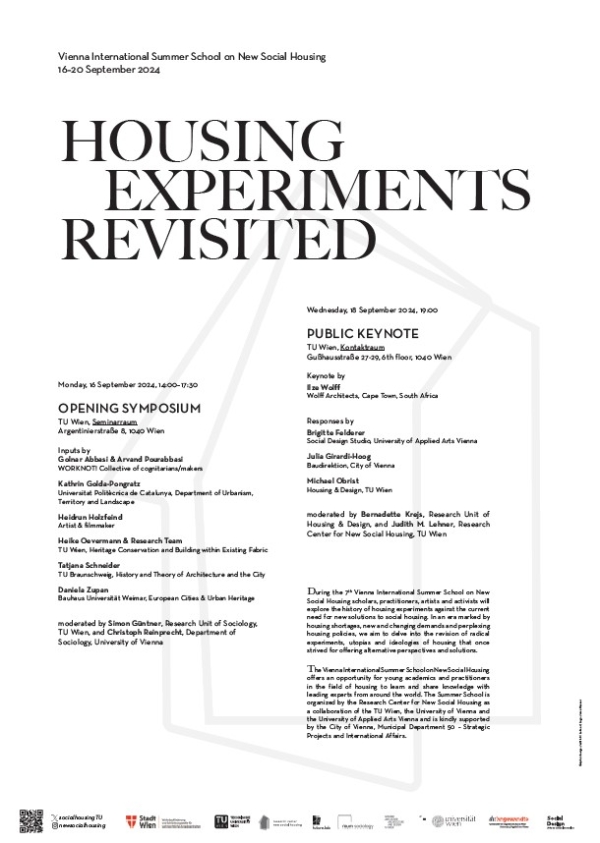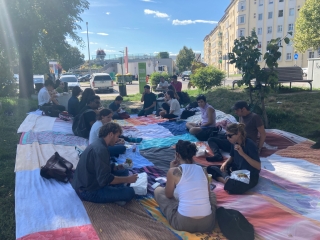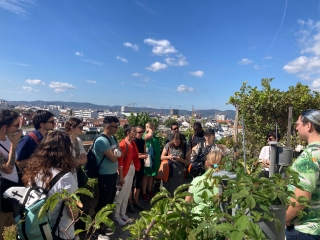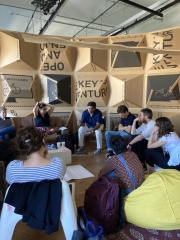For the two reflection workshops on Wednesday and Friday, we will split into
three groups, each pursuing one specific route of thought. On Wednesday morning, the session will open the field with appraising
the international contributions, whilst on Friday morning we bring in impressions from the excursions. To guide the reflections,
we have proposed three themes through which housing experiments can be explored:
1.
Experimental Housing: Exploring Ideas, Concepts, and Biographies of Historic ProjectWhat have been forward-thinking
elements of social housing experiments – or the possible dystopian outcomes – that (still) resonate today?
Why have some
experiments gained prominence and were placed in public or academic archives while others have slipped institutional or collective
memory?
2. Housing Utopias: Understanding Contexts,
Ambitions, and Translations into PracticeHow have projects adapted to social and generational changes? How
do housing experiments position themselves within their surroundings?
How did experiments fail, and what were the underlying
reasons for their failures?
3. Housing Innovation:
Examining Drivers and Outcomes of Technological, Ecological, and Social Change Over TimeHow have housing struggles
and protest inspired the development of new solutions? How have dwellers, the state and the market collaborated in housing
innovation?
Participants are asked to make best use of talks and walks, visits and presentations to think about
these questions. We will use documenting and mapping methods to visualize thoughts, gathered material, references, photos
on the map for each group. To pursue the themes and corresponding questions, participants will apply mapping techniques by
collecting impressions (through pieces of texts, photos, quotes,…) and relating them amongst each other as well as with the
framework provided by the map. Prepared map material will be handed out to each group. Feel free to print additional material,
sketch and draft ideas on the maps. The maps will be scanned and presented on screens during the final discussion. In the
workshops, the individual views will come together to a collective position, and the groups are encouraged to produce statements
to stir debate in the final plenary session. These need not be fully elaborated, but will hopefully be thought-provoking and
bold.
Opening Symposium
16 September 2024, 14–18:00
TU Wien, Seminarraum
Argentinierstraße 8, 1040 Vienna
Die Veranstaltung findet in englischer Sprache statt.
Inputs by
Golnar
Abbasi & Arvand Pourabbasi, WORKNOT! Collective of architects, educators, researchers
Kathrin Golda-Pongratz,
Universitat Politècnica de Catalunya, Department of Urbanism, Territory and Landscape
Heidrun Holzfeind,
Artist & filmmaker
Heike Oevermann & Research Team, TU Wien, Heritage Conservation and Building
within Existing Fabric
Tatjana Schneider, TU Braunschweig, History and Theory of Architecture and the
City
Daniela Zupan, Bauhaus Universität Weimar, European Cities & Urban Heritage
moderated
by Simon Güntner, Research Unit of Sociology,
TU Wien, and Christoph Reinprecht, Department of Sociology, University
of Vienna
Public Lecture
18 September 2024, 19:00
TU Wien, Kontaktraum,
Gußhausstraße 27-29, 1040 Wien
Keynote by
Ilze Wolff
Wolff Architects, Cape Town, South
Africa
Responses by
Brigitte Felderer, Social Design Studio, University of Applied Arts Vienna
Julia Girardi-Hoog, Baudirektion, City of Vienna
Michael Obrist, Housing & Design,
TU Wien
moderated by Bernadette Krejs, Research Unit of Housing & Design, and Judith M. Lehner, Research Center
for New Social Housing, TU Wien
Final discussion
20 September 2024, 13:30–15:00
TU Wien, Seminarraum AEU140, Karlsplatz 13, 1040 Wien
with Amila Širbegović (MA50, Referat für strategische Projekte
und Internationales) and invited local experts on housing and urban development
Public events open to interested
audience
https://newsocialhousing.conf.tuwien.ac.at/405-2/







